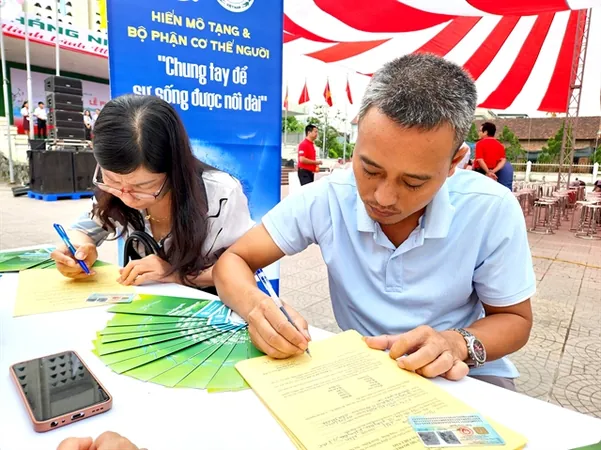
New Proposal in Vietnam: Tissue Donation for Teens Aged 16 and Up!
2025-03-26
Author: Jia
Introduction
In an ambitious move aimed at addressing the growing need for organ transplants, Vietnam's Ministry of Health has proposed a groundbreaking policy allowing tissue donation from individuals aged 16 and older. This initiative, part of the draft amendments to the Law on Donation, Removal, and Transplantation of Human Tissues, Organs and Cadavers, could revolutionize the landscape of organ donation in the country.
Current Legislation
As it stands, the current legislation permits only those aged 18 and above to donate organs while alive, with prohibitions on donations from anyone under this age. The proposed changes would enable those as young as 16 to donate kidneys or even part of their liver, provided they receive written consent from a legal representative or guardian. This marks a significant shift towards inclusivity in the process of living tissue donation.
Posthumous Donation Rights
The draft amendments also detail the rights of individuals to become posthumous donors, emphasizing that everyone can donate their tissues and organs after death. However, for those under 18 wishing to donate posthumously, consent from a parent or guardian remains mandatory.
Cost Logistics
Additionally, the proposal aims to streamline the logistics surrounding the costs associated with both living and posthumous donations. Living donors will have their medical examinations, biological testing, and subsequent care covered, while posthumous donations will ensure that costs related to organ procurement are clearly defined.
Benefits for Donors
One of the remarkable highlights of the proposal is the introduction of additional benefits for blood and stem cell donors. These individuals will enjoy priority access to blood transfusions and stem cell sources when they need them, promoting a culture of donation while also safeguarding donor health. Importantly, donors will receive comprehensive consultations regarding their health and potential risks, reassuring them of their decision.
Current State of Organ Donation in Vietnam
Despite Vietnam's strides in organ transplantation—boasting the highest rate in Southeast Asia at over 1,000 cases annually—the nation still grapples with a critical shortage of organ donations, particularly from deceased donors. Currently, Vietnam's posthumous donation rate is among the lowest globally, raising concerns about the sustainability of transplant programs.
Education and Awareness
The Ministry's draft also aims to tackle the disconnect in organ donation education and awareness. Currently, very few hospitals have established organ donation counseling teams, often leaving potential donors and families in the dark about the donation process and its significance.
Conclusion
Through this proposed legislation, Vietnam aims not only to increase the availability of organs for those in need but also to foster a community of informed and willing participants in the donation process. By embedding humanitarian principles into the organ donation framework, the government hopes to bridge the gap between the rising demand for transplants and the stagnant supply of organs.
Overall, this landmark proposal represents a critical step forward in Vietnam's healthcare system, which could save countless lives while ensuring that young individuals are included in life-saving initiatives. The conversation around organ donation is evolving, and with it, the hopes of many who await transplants continue to rise. Stay tuned for more updates on this developing story!


 Brasil (PT)
Brasil (PT)
 Canada (EN)
Canada (EN)
 Chile (ES)
Chile (ES)
 Česko (CS)
Česko (CS)
 대한민국 (KO)
대한민국 (KO)
 España (ES)
España (ES)
 France (FR)
France (FR)
 Hong Kong (EN)
Hong Kong (EN)
 Italia (IT)
Italia (IT)
 日本 (JA)
日本 (JA)
 Magyarország (HU)
Magyarország (HU)
 Norge (NO)
Norge (NO)
 Polska (PL)
Polska (PL)
 Schweiz (DE)
Schweiz (DE)
 Singapore (EN)
Singapore (EN)
 Sverige (SV)
Sverige (SV)
 Suomi (FI)
Suomi (FI)
 Türkiye (TR)
Türkiye (TR)
 الإمارات العربية المتحدة (AR)
الإمارات العربية المتحدة (AR)